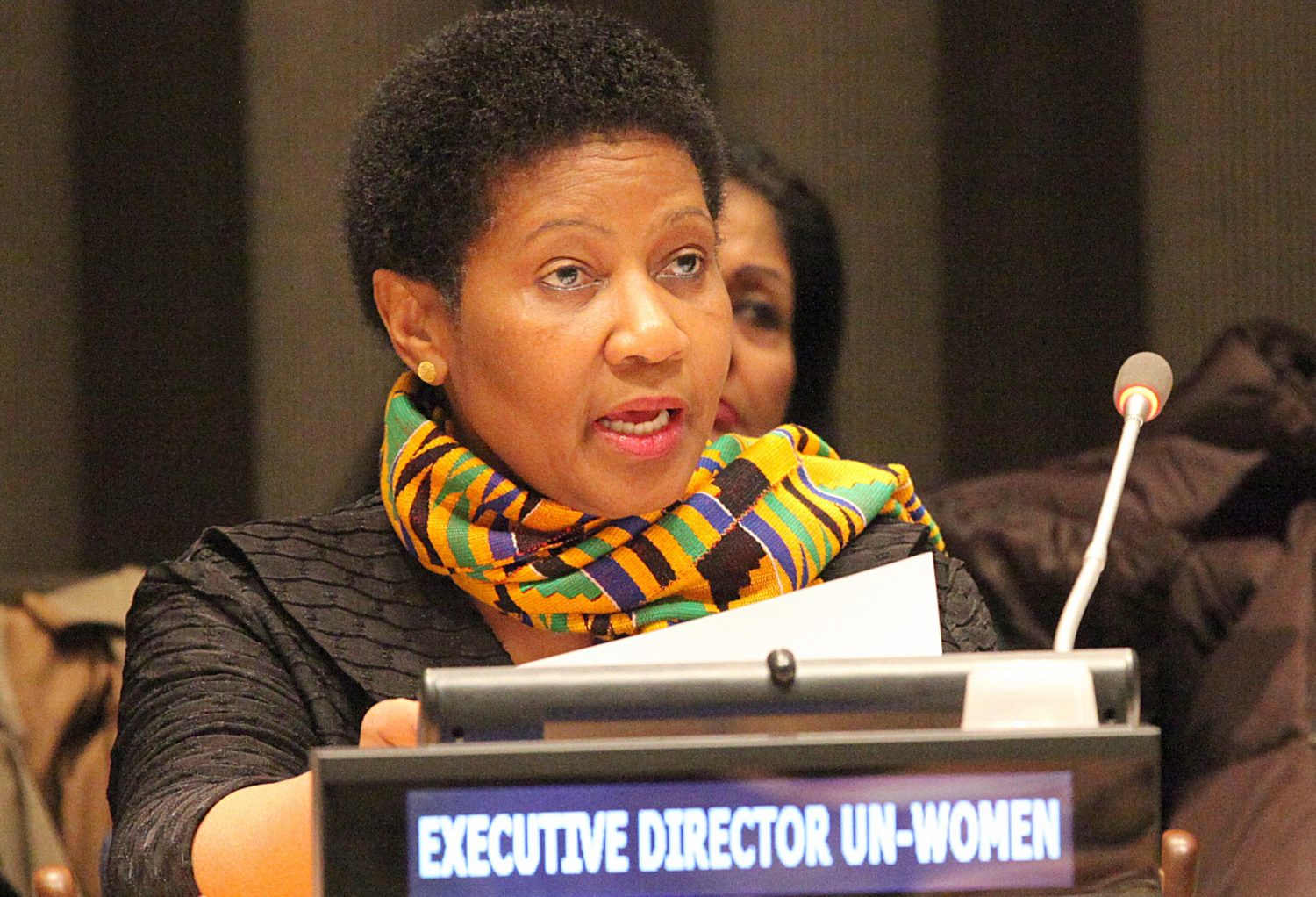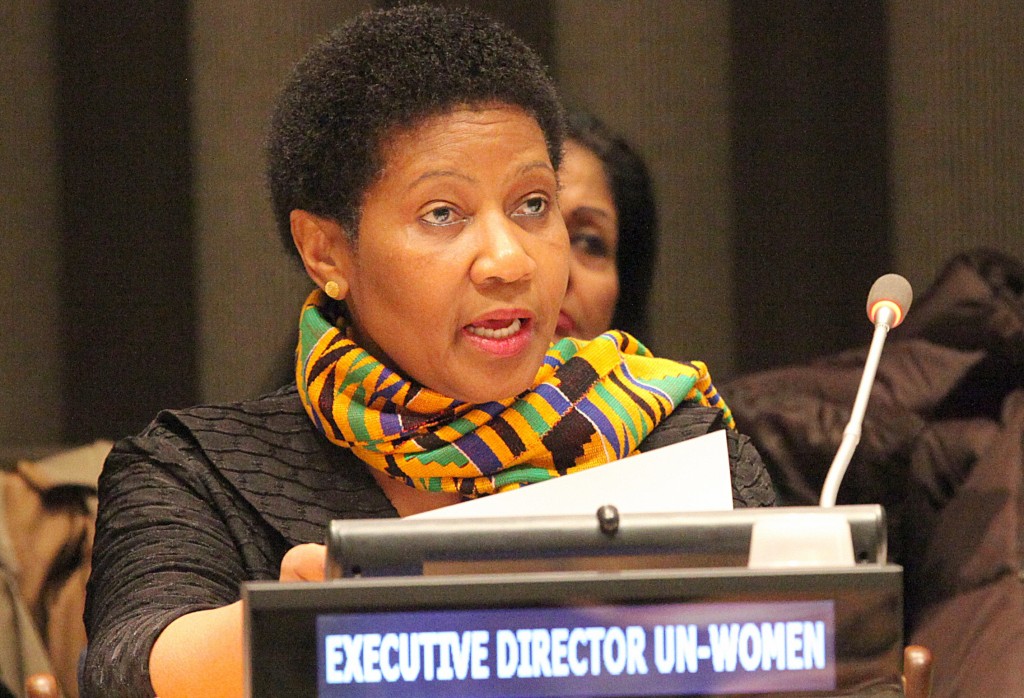Meet U.N. Under-Secretary-General Phumzile Mlambo-Ngcuka
BY LISA FRENCH
U.N. Secretary-General Ban-Kimoon’s mandate will not expire until next year, but already the debate is raging about his replacement, with calls for the next U.N. body’s boss to be a woman. One of the African women most suitable for the high-profile job is the organization’s Under-Secretary-General and Executive Director of U.N. Women, South African-born Phumzile Mlambo-Ngcuka.
Mlambo-Ngcuka, 59, was sworn in as Under-Secretary-General and Executive Director of U.N. Women on August 19, 2013, bringing to the position a vast array of experiences and expertise drawn from a long career spanning more than a decade dedicated to fighting for human rights and social justice. She has worked in government in her home country, in the private sector and with civil society.
Mlambo-Ngcuka was deputy president of South Africa from 2005 to 2008, being the first woman in the history of South Africa to hold the high position. Her responsibilities included overseeing programs geared toward combating poverty and allowing the poor to rip the benefits of the country’s growing economy, focusing especially on women. From 1999 to 2005 she served as Minister of Minerals and Energy. She was appointed Deputy Minister of Trade and Industry in 1996, a position she held until 1999. Prior to this, she was elected as a Member of Parliament in 1994 and was chair of the Service Portfolio commission, thus serving (until 1996) as part of South Africa’s first democratic government.
Phumzile Mlambo-Ngcuka was born in Clermont, Durban on November 3, 1955 to Michael and Sabbath Mlambo. She is married to Bulelani Ngcuka, formerly head of the National Prosecuting Authority. She moved to Inanda where she attended the Ohlange High School. She joined the University of Lesotho in 1980 where she earned her Bachelor’s Degree in Social Science and Education, which led to a brief teaching career in KwaZulu-Natal from 1981 to 1983. Mlambo-Ngcuka later completed her PhD in Education and Technology at the University of Warwick, United Kingdom. She was a founding member and director of the Young Women’s International Programme at the Young Women’s Christian Association (YWCA) office in Geneva from 1984 to 1987, where she established a global program for young women. She is the founder of the Mlambo Foundation dedicated to supporting leadership and education.
As Under-Secretary-General and Executive Director of U.N. Women, Phumzile Mlambo-Ngcuka doesn’t just sit in her elegant office at the U.N. Headquarters in New York. She also carries out her duties by traveling to various spots in the world. From March 22-24, she visited Sierra Leone, one of the three African countries hardest hit by the Ebola crisis that has claimed more than 10,000 lives. She met with President Ernest Bai Koroma and other high-level government officials as well as women leaders and others to discuss “the gender dimensions of the Ebola virus.” Mlambo-Ngcuka used the occasion to state her office’s commitment to Sierra Leone’s development agenda, namely the country’s “Agenda for Prosperity.”
The visit to Sierra Leone came just two days after the completion of the two-week meeting of the U.N. Commission on the Status of Women (CSW) at the headquarters in New York.
Phumzile Mlambo-Ngcuka said in her opening speech to the CSW that progress towards achieving the blueprints of the Beijing platform of action adopted twenty years ago has been slow. “Serious stagnation and even regression” was evident in several areas, she pointed out. She emphasized that at the current pace of progress, it will take more than 80 years to achieve gender parity in economic participation, and 50 years to reach parity in parliamentary representation.
The U.N. Official also called for a change of attitude which, she said, perpetuates the culture of male superiority: “What has not been done, however, is to change the attitudes that perpetuate the culture of male superiority and the stereotypes that diminish women. This, unfortunately, has subverted the gains that the good laws can bring.” She added: “There remains an unresolved clash between the modern laws and customary laws that has robbed us of the benefits of these good laws. If we do not address this, our progress will always be compromised. This is what we have to deal with now, once and for all.” Mlambo-Ngcuka hammered out: “In 2030 we want to be able to talk about a world that has achieved gender equality. A 50-50 planet.”
In her closing speech, the executive-director of U.N. Women, after breaking down the CWS Political Declaration which contains the member-states ministers’ pledge for action, she stated, boldly: “The discussions of these last two weeks have made it crystal clear that the gaps and the issues are both structural and psychological. There can be no real progress in changing the world for women unless we change both.” She added: “We have to change all of society: men, women, rural or urban communities, traditional communities, young people and children.” With her eyes on the 2030 horizon, she pointed out: “When we change the laws and the customary practices, as well as the attitudes and beliefs that shape behaviors, we will have a world in which to thrive. Our hard work will pay off.”
This African woman suitable to be the next Secretary-General of the United Nations concluded: “The countdown to 2030 begins now.”



